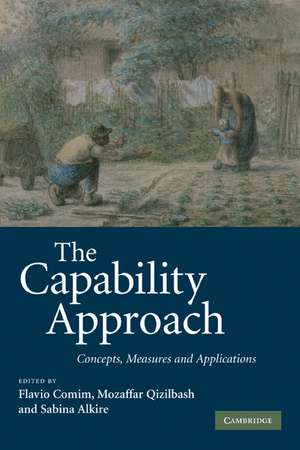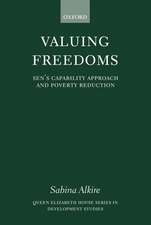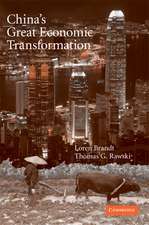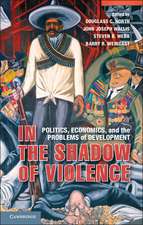The Capability Approach: Concepts, Measures and Applications
Editat de Flavio Comim, Mozaffar Qizilbash, Sabina Alkireen Limba Engleză Paperback – 23 iun 2010
| Toate formatele și edițiile | Preț | Express |
|---|---|---|
| Paperback (1) | 420.97 lei 6-8 săpt. | |
| Cambridge University Press – 23 iun 2010 | 420.97 lei 6-8 săpt. | |
| Hardback (1) | 1017.46 lei 6-8 săpt. | |
| Cambridge University Press – 23 apr 2008 | 1017.46 lei 6-8 săpt. |
Preț: 420.97 lei
Nou
Puncte Express: 631
Preț estimativ în valută:
80.55€ • 84.32$ • 67.05£
80.55€ • 84.32$ • 67.05£
Carte tipărită la comandă
Livrare economică 01-15 aprilie
Preluare comenzi: 021 569.72.76
Specificații
ISBN-13: 9780521154529
ISBN-10: 0521154529
Pagini: 634
Ilustrații: black & white illustrations
Dimensiuni: 152 x 229 x 38 mm
Greutate: 0.93 kg
Editura: Cambridge University Press
Colecția Cambridge University Press
Locul publicării:Cambridge, United Kingdom
ISBN-10: 0521154529
Pagini: 634
Ilustrații: black & white illustrations
Dimensiuni: 152 x 229 x 38 mm
Greutate: 0.93 kg
Editura: Cambridge University Press
Colecția Cambridge University Press
Locul publicării:Cambridge, United Kingdom
Cuprins
List of figures; List of tables; Introduction; 1. Using the capability approach: prospective and evaluative analyses Sabina Alkire; Part I. Concepts: 2. Amartya Sen's capability view: insightful sketch or distorted picture? Mozaffar Qizilbash; 3. Sen's capability approach and feminist concerns Ingrid Robeyns; 4. Beyond individual freedom and agency: structures of living together in the capability approach to development Séverine Deneulin; 5. Does identity matter? On the relevance of identity and interaction for capabilities Miriam Teschl and Laurent Derobert; 6. Measuring Capabilities Flavio Comim; Part II. Measures: 7. Do concepts matter? An empirical investigation of the differences between a capability and a monetary assessment of poverty Caterina Ruggeri Laderchi; 8. Social exclusion in the EU: a capability-based approach Fotis Papadopoulos and Panos Tsakloglou; 9. Complexity and vagueness in the capability approach: strengths or weaknesses? Enrica Chiappero Martinetti; 10. Operationalising Sen's capability approach: the influence of the selected technique Sara Lelli; 11. Operationalizing capabilities in a segmented society: the role of institutions Kanchan Chopra and Anantha Kumar Duraiappah; Part III. Applications: 12. Democracy, decentralisation and access to basic services: an elaboration on Sen's capability approach Santosh Mehrotra; 13. Reinforcing household's capabilities as a way to reduce vulnerability and prevent poverty in equitable terms Jean-Luc Dubois and Sophie Rousseau; 14. Capabilities over the lifecourse: at what age does poverty damage most? Shahin Yaqub; 15. Social policy and the ability to appear in public without shame: some lessons from a food relief programme in Kinshasa Tom De Herdt; 16. The capability approach and gendered education:some issues of operationalisation in the context of the HIV/AIDs epidemic in South Africa Elaine Unterhalter; 17. Women and poverty In Mozambique: is there a gender bias In capabilities, employment conditions and living standards? Pier Giogio Ardeni and Antonio Andracchio; 18. From the quantity to the quality of employment: an application of the capability approach to the Chilean labour market Kirsten Sehnbruch; Index.
Recenzii
Review of the hardback: 'Amartya Sen's notion of capabilities is a rich source of new ideas and philosophical debates about such diverse and wide ranging issues as development, poverty, inequality, human rights, gender, identity and democracy. Here is a collection of well-researched and cogently written essays discussing these many aspects and taking the debates further. It will provide a quarry of ideas for policy makers, researchers, teachers and students of these many issues.' Lord Meghnad Desai, Emeritus Professor of Economics and former director of the Centre for Global Governance, London School of Economics
Review of the hardback: 'These essays on Amartya Sen's capability approach to thinking about human well-being, and so about poverty and development, raise fundamental questions. Can a capabilities approach yield coherent and convincing concepts of well-being and of poverty, or ways of measuring them? What, if anything, does it do better than income- or resource-based approaches? Or is a demand that it 'do better' in the terms of its rivals simply evidence of failure to think through the implications of taking capabilities, and thereby human agency and diversity, seriously? If so, how should the success of work based on capabilities be judged? Why is there so much disagreement over the supposed individualism of the capabilities approach? Has the approach led to significant practical initiatives? The essays in this ample collection offer a rich and often detailed reflection on these and other fundamental questions, and some sharp analyses of central questions about capabilities.' Baroness Onora O'Neill, Professor of Philosophy, University of Cambridge
Review of the hardback: 'These essays on Amartya Sen's capability approach to thinking about human well-being, and so about poverty and development, raise fundamental questions. Can a capabilities approach yield coherent and convincing concepts of well-being and of poverty, or ways of measuring them? What, if anything, does it do better than income- or resource-based approaches? Or is a demand that it 'do better' in the terms of its rivals simply evidence of failure to think through the implications of taking capabilities, and thereby human agency and diversity, seriously? If so, how should the success of work based on capabilities be judged? Why is there so much disagreement over the supposed individualism of the capabilities approach? Has the approach led to significant practical initiatives? The essays in this ample collection offer a rich and often detailed reflection on these and other fundamental questions, and some sharp analyses of central questions about capabilities.' Baroness Onora O'Neill, Professor of Philosophy, University of Cambridge
Descriere
An analysis of Amartya Sen's capability approach in the context of poverty and justice.














